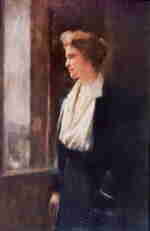 SKC Films Library SKC Films Library |
| SKC Films Library >> General and Old World History >> Great Britain >> England >> 20th Century |
 Nancy
Langhorne Shaw Astor Nancy
Langhorne Shaw Astorthe first woman to serve in the House of Commons Nancy Witcher Langhorne was born in Danville, Virginia, on May 19, 1879. Her father was a very successful plantation owner and businessman, and she was exposed to high society at an early age. It was while attending finishing school in New York City that she met Robert Gould Shaw, whom she married in 1897. The marriage was rocky almost from the beginning, and the couple divorced in 1903. She and her son Robert moved to England soon after, and it was there that she would gain fame. Moving among the social elite of England, Nancy had the opportunity to meet some of the richest and most powerful people in the British Empire. One of those persons happened to be William Waldorf Astor, the great-great-grandson of John Jacob Astor, the first American multi-millionaire. The two were married in 1906, and ultimately had five children. Waldorf Astor inherited the title of Viscount upon his father's death in 1919, and was thereby forced to give up his seat in the House of Commons. Despite being an American and having no formal political experience, Nancy Astor decided to run for her husband's vacated seat, and was elected by a substantial majority, on November 28, 1919. She was continuously returned to that body by the voters of Plymouth until 1945, when she retired from politics. Nancy Astor was not the first woman to be elected to the House of Commons, for that honor went to Constance Markievicz, who was elected by St. Patrick's (Ireland) in 1918. But, since Markievicz refused to take her seat, Astor became the first woman to sit in that body. Astor took a lively interest in most of the questions before the House of Commons, but the fact that she was for two years the only woman member made it inevitable that the various women's organizations looked to her for representation on issues regarding women and children. She became an advocate for the amendment of the legitimacy laws, and for the equal guardianship of children (in matters of divorce). In 1921 she became chairman of a committee established for the purpose of bringing the various women's organizations under one common umbrella. Outside issues relating exclusively to women, her chief work was done for a progressive educational policy, for temperance, and for the extension of the Trade Boards Acts. She constantly advocated the raising of the school age, and in 1923 she carried through the Intoxicating Liquor (Sale to Persons Under 18) Bill. She was also an advocate for various labor interests. Viscountess Astor died at her daughter's home at Grimsthorpe, in Lincolnshire, on May 2, 1964. Her memoirs, My Two Countries, were published in 1920. Her Children Robert Gould Shaw III (1898-1970) SOURCE SEE ALSO |
| SKC Films Library >> General and Old
World History >> Great Britain >> England >> 20th Century This page was last updated on June 06, 2017. |